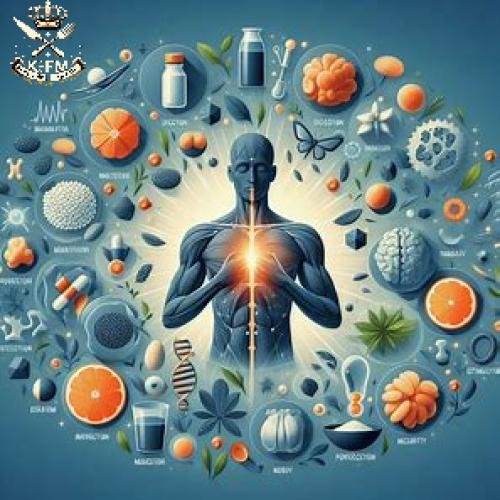Vitamin B1, also known as thiamine, is an essential element for the body’s health, as it contributes to converting food into energy to support cell functions. It helps improve the health of the nervous system and heart, and supports digestion. It is found in foods such as whole grains and legumes. A deficiency in B1 can lead to health issues such as fatigue, muscle weakness, and nervous system disorders. However, excessive intake through supplements may cause rare side effects like digestive disturbances. Maintaining a balance of vitamin B1 through a varied diet is the best option for sustainable health.
The Importance of Vitamin B1 for the Body
Vitamin B1 is a water-soluble vitamin, meaning it is not stored in the body for long periods. Therefore, it is essential to obtain it regularly through the diet. This vitamin plays a key role in the process of converting carbohydrates into energy and helps maintain the health of nerves and muscles.

Symptoms of Vitamin B1 Deficiency
A deficiency in Vitamin B1 can lead to several health issues, the most prominent of which include:
- Nerve Inflammation (Beriberi): A medical condition that causes nerve weakness and symptoms such as numbness and tingling in the limbs, difficulty moving, and in advanced stages, it can lead to breathing problems.
- Heart Problems: Vitamin B1 deficiency can cause heart enlargement and muscle weakness, which may lead to circulatory issues and blood pressure problems.
- Nervous System Issues: Thiamine deficiency can cause problems such as memory loss, confusion, and short-term memory impairment.
- Psychological Disorders: Psychological symptoms associated with Vitamin B1 deficiency may include depression, irritability, and inability to concentrate.
- Dementia and Alzheimer's Disease: Some studies suggest a link between Vitamin B1 deficiency and an increased risk of dementia and Alzheimer's disease, as this vitamin plays a crucial role in brain health.
Causes of Vitamin B1 Deficiency Beyond Poor Nutrition:
- Medical Conditions: Certain conditions like Crohn’s disease, ulcerative colitis, and congestive heart failure may cause poor absorption of Vitamin B1.
- Surgical Procedures: Some surgeries, especially those affecting the digestive system, may lead to Vitamin B1 deficiency.
- Pregnancy and Breastfeeding: The body's need for Vitamin B1 increases during these periods, raising the risk of deficiency if dietary needs are not met.
- Alcohol Addiction: Alcohol reduces the body’s ability to absorb Vitamin B1 and increases its excretion in urine.
- Drug Interactions: Certain medications, such as antacids and antibiotics, can interfere with the absorption of Vitamin B1.
- Special Cases: People on restrictive diets, such as vegetarians, may be at higher risk for deficiency if they do not carefully plan their diet.

Dietary Sources of Vitamin B1
To maintain adequate levels of Vitamin B1, it is essential to include foods rich in it in your diet. Some of the prominent food sources of Vitamin B1 include:
- Whole Grains: Such as brown rice and oats, which are among the richest sources of Vitamin B1.
- Meat: Particularly pork and turkey, which contain good amounts of thiamine.
- Legumes: Such as lentils and beans, which are excellent sources of thiamine.
- Nuts and Seeds: Provide good amounts of Vitamin B1, such as sunflower seeds.
- Yeast: Contains large amounts of Vitamin B1 and can be used as a dietary supplement.
How to Prevent Vitamin B1 Deficiency
To maintain adequate levels of Vitamin B1 and prevent deficiency, it is recommended to follow these tips:
- Diversify Your Diet: Ensure you consume a variety of Vitamin B1-rich foods to guarantee an adequate intake.
- Focus on Nutritional Balance: Avoid relying on processed and refined foods, as they may lack Vitamin B1 and other essential nutrients.
- Consult a Doctor: If you experience symptoms that may indicate a Vitamin B1 deficiency, it is advisable to consult a doctor for necessary tests and appropriate treatment.
Benefits of Vitamin B1 for General Health
- Improved Physical Performance: Vitamin B1 helps boost energy and enhances physical ability, contributing to better performance in daily activities.
- Supporting Brain Function: Thiamine plays a role in supporting brain functions and memory, enhancing the ability to think and focus.
- Promoting Heart Health: It helps maintain cardiovascular health by improving muscle function and regulating blood circulation.
- Aiding Digestion: Vitamin B1 enhances the digestive process and supports the digestive system, aiding in the efficient absorption of nutrients.
- Energy Production: Vitamin B1 plays a vital role in converting carbohydrates into energy.
- Nervous System Health: It helps maintain the health of nerves and muscles, reducing the risk of neurological diseases such as beriberi.
- Mood Improvement: Some studies suggest that a deficiency in Vitamin B1 can cause psychological symptoms such as stress and depression. Therefore, consuming adequate levels of Vitamin B1 may help improve overall mood.
- Enhancing Mental Performance: Vitamin B1 plays a vital role in enhancing concentration and memory. Some studies indicate that individuals with a deficiency may have difficulty thinking and focusing.
Recommended Daily Dose:
- For adult men: 1.2 mg daily.
- For adult women: 1.1 mg daily.
- For pregnant and breastfeeding women: 1.4 mg daily.
- For children: The recommended dose ranges from 0.2 mg to 1.2 mg depending on age.
Interactions with Other Vitamins:
Vitamin B1 interacts positively with certain other vitamins. For example:
- Vitamin B12: Vitamin B1 enhances the absorption of Vitamin B12 and increases its effectiveness in the body. Taking both together helps support nervous system functions.
- Vitamin C: Vitamin C aids in enhancing the absorption of Vitamin B1, improving its utilization in the body. Therefore, taking both vitamins together can provide the best benefit.
On the other hand, some supplements or medications may negatively affect the absorption of Vitamin B1, such as antacids or certain antibiotics. Therefore, it is advisable to consult a doctor before using any supplements.
Frequently Asked Questions:
- What is the effect of Vitamin B1 deficiency on children?
Vitamin B1 deficiency in children can lead to delayed growth, muscle weakness, and nervous system disorders. In severe cases, it may cause health problems such as nerve inflammation or memory loss. - Can Vitamin B1 supplements be taken regularly?
It's best to obtain Vitamin B1 through a balanced diet. However, in cases of severe deficiency or the presence of risk factors like chronic diseases, a doctor may recommend taking Vitamin B1 supplements. - Does Vitamin B1 help treat sleep disorders?
Vitamin B1 plays a role in improving the health of the nervous system, which may help reduce insomnia and sleep disturbances caused by stress and anxiety. - Are there side effects from taking excessive amounts of Vitamin B1?
Vitamin B1 is a water-soluble vitamin, meaning the body excretes it in urine if consumed in large quantities. However, excessive intake of supplements may cause rare side effects such as digestive issues. - How can Vitamin B1 deficiency be diagnosed?
Vitamin B1 deficiency can be diagnosed through a blood test to measure thiamine levels in the body. Doctors can also evaluate clinical symptoms such as memory problems, muscle weakness, and nerve pain.
Conclusion:
Vitamin B1 is an essential nutrient that plays a crucial role in maintaining general health and preventing diseases. By understanding the importance of this vitamin and recognizing the symptoms related to its deficiency, we can take preventive measures to ensure we get the right amount of it. Incorporating foods rich in Vitamin B1 into our diet and consulting healthcare professionals when needed will help maintain our overall health and well-being.




















